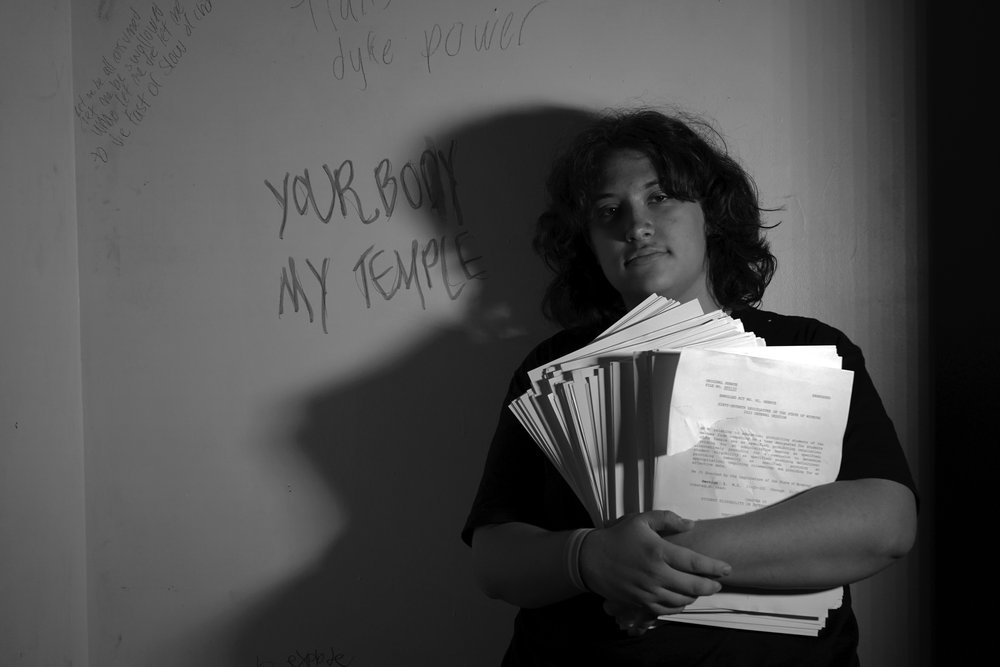Using Art to Transform ‘Something So Ugly’ into ‘Something So Beautiful’
May 21, 2024

Maggie Letvin ’24, an ARHU triple major, said UMD showed them they can’t live life without making art.
By Jessica Weiss ’05
As growing numbers of lawmakers across the country introduced bills targeting trans and gender-expansive people, Maggie Letvin ’24 knew they wanted to use their art practice to respond.
So last year, the triple degree honor student, in studio art, immersive media design and art history, began collecting every single anti-trans bill introduced or passed in 2023 from all 50 states and at the federal level. Four months later, they had amassed a 50 pound box filled with over 3,300 pages of text. They then took the legislation “on a journey”—involving elements like photography, paper-shredding and paper-making, poetry, performance and more—that became their art honor’s thesis.
Letvin recently won first place in the 2024 Sadat Arts for Justice and Peace Program for one piece in the project, “Through My Skin,” a paper etching made from shredded legislation.
“I wanted to tell a story related to the legislation and the words and political things going on,” said Letvin, “but also about what an artist can do to transform something so ugly into something so beautiful.”
Letvin graduates from UMD this week and plans to take time off while they apply to graduate school. They hope to pursue an M.A. in art history and an MFA in studio art before working as a university professor.
“I’ve realized at UMD that I can’t live without making art,” Letvin said. “I would be cheating myself out of the best parts of life.”
Letvin didn’t always consider themself an artist. Growing up in Howard County, Maryland, they had multiple interests—from linguistics to media to forensics—and came to UMD “undecided.” They began studying studio art in Fall 2020 while classes were still virtual due to the COVID-19 pandemic, but really “fell in love with it” once in person learning resumed. Letvin adored working with their hands and especially enjoyed screen printing, where they cherished the studio community and the opportunity to explore and be conceptual and “weird.” They even came up with a term to describe themself: “performative print maker.”
“I love printmaking and I love performance art so I like combining those things together,” said Letvin, who once made an experimental print work with dead bugs and live worms. Recently they consumed 16 oz. of anti-trans legislation (mixed with water) as a performance aspect of their project.
Their studies in art history, specifically in modern and contemporary queer art, have complemented their art practice. Their 35 page honors thesis explores “queer bathroom art” and bathroom graffiti that traverses themes of sexuality. It focuses on works ranging from the intimate photography of Nan Goldin and Lyle Ashton Harris to their own queer interpretation of Andres Serrano’s controversial 1987 work “Piss Christ,” which portrays a crucifix submerged in urine.
Letvin is also part of the inaugural graduating class of the immersive media design (IMD) major, which is housed in both ARHU and the College of Computer, Mathematical, and Natural Sciences and combines digital art and computer science. In IMD, Letvin focused on how new technologies, like augmented and virtual reality, could be made more accessible to a wider range of people, such as through correcting for obstacles due to motion sickness. While working as a teaching assistant for “Digital Media Theory and Culture,” IMD’s intro theory class, with Assistant Professor Cy Keener and Lecturer Charlotte Richardson-Deppe, Letvin successfully worked to add an accessibility unit to the syllabus.
They also dove heavily into the theory of “the medium is the message,” which means that the form of a message—whether print, visual, or musical—determines how it is perceived.
“I ended up really enjoying writing about the media and media theory,” Letvin said.
Outside of class, Letvin played rugby, was in the metalheads of Maryland club, and worked for Student Entertainment Events (SEE), organizing and supporting campus events. In that role, they helped create SEE’s first student drag competition earlier this year. They also work security at the 9:30 Club in Washington, D.C.
Letvin said they will most miss the print shop at UMD, where they have spent countless hours over the last three years. Letvin even served as an undergraduate teaching assistant for two print classes. They especially enjoyed working with Associate Professor Justin Strom, who was Letvin’s honors thesis advisor and worked closely with them on the yearlong anti-trans legislation project.
Strom was there as Letvin first opened the boxes that held thousands of pages of the printed legislation, and encouraged their creative exploration: “He really helped me realize all I could do with this,” Letvin said.
They added: “This project took so much care and time. I had such a special experience.”

